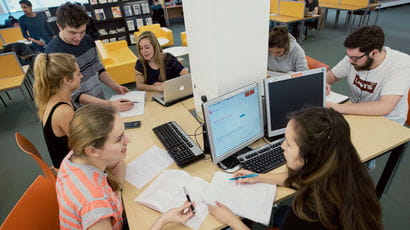Get support from PAL
How PAL can help you
Peer Assisted Learning (PAL) is an undergraduate student-to-student mentor scheme.
If you are a Foundation or year 1 student, and your course has PAL, your PAL Mentor will provide study skills and subject support by using their own lived experience of the module, programme and university life. They can also help you:
- connect and collaborate with other students
- gain a deeper understanding of course content and expectations
- set goals and action-plan
- boost your study habits
- orientate to the other support services at the University
- get involved in wider University activities.
Your PAL mentor will guide and support you through mentoring conversations, but will not teach you, check your work or provide all the answers.

How PAL works
How peer support is delivered
PAL mentoring normally takes place on campus, but some programmes may have a mix of online and on campus PAL support. This will either be in your timetable as a separate session or your PAL Mentor will be present in one of your taught sessions on a regular basis.
We recommend you listen out for 'PAL' during Starting Block and find out who your PAL Mentor is. At the start of term, they can help you settle in and get orientated to the campus and its systems.
Later in Term 1, support is linked more to content that you have covered in lectures, seminars or workshops. You can also ask your PAL Mentor for guidance about exam techniques, assignment/project preparation, referencing, presentation skills and how to act on lecturer feedback.
All PAL participants are encouraged to stay connected with their PAL group and PAL Mentor in between sessions through their PAL-specific team area on Microsoft Teams. This is an informal and supportive online space where you can post questions and share resources.
What to expect from PAL
Find out what happens in a PAL session.
How PAL is different
Peer support is different from other forms of academic and study skills support
- Our trained student PAL Mentors can understand and relate to the questions, challenges and experiences you have. They have been where you are now and understand your worries, fears and confusions.
- The subject support and study skills tips are provided by students who have studied your programme content recently.
- PAL focuses on the process, not just the outcome. In other words, PAL doesn’t just help you know the answers but helps you to come to the answers yourself.
- PAL is where you can share ideas, talk about issues and make mistakes without fear of judgement and where communication is informal, authentic and personalised.
Become a PAL Mentor
Put your knowledge and experience of being a UWE Bristol student to good use by helping other students to help themselves, and get paid for it.
Be a PAL MentorYou may also be interested in

Study skills
Support to help you study, including referencing, academic writing, research skills, time management, reading, plagiarism advice, and IT.

Health and wellbeing
Health and wellbeing services for students at the University.

Academic information
Advice on academic-related issues and what to do if something happens which affects your studies.
